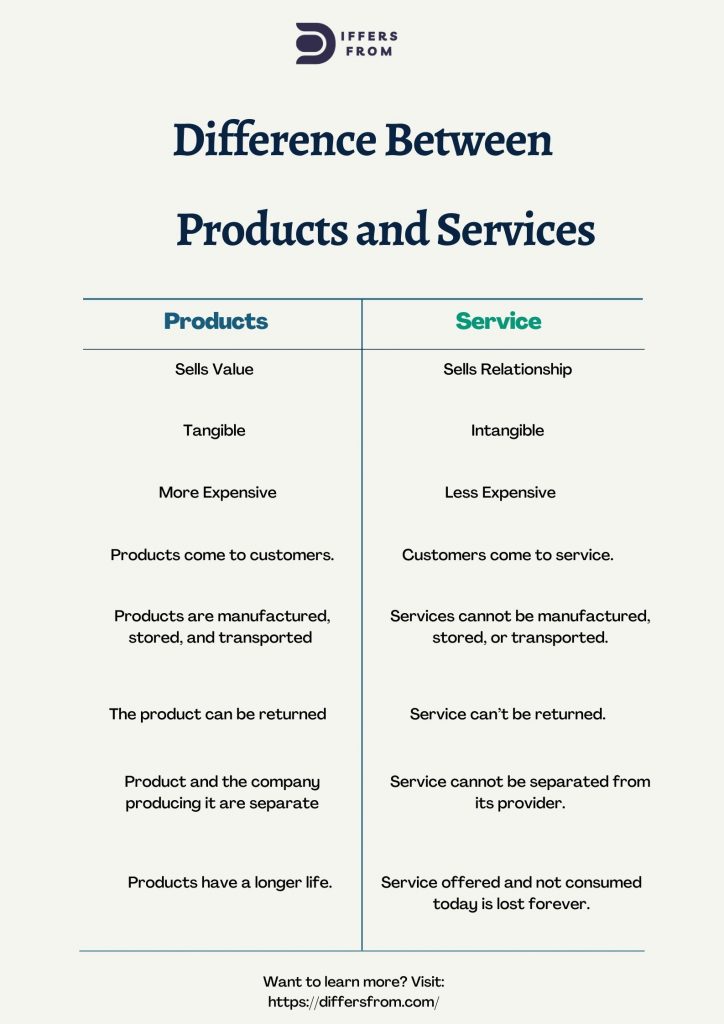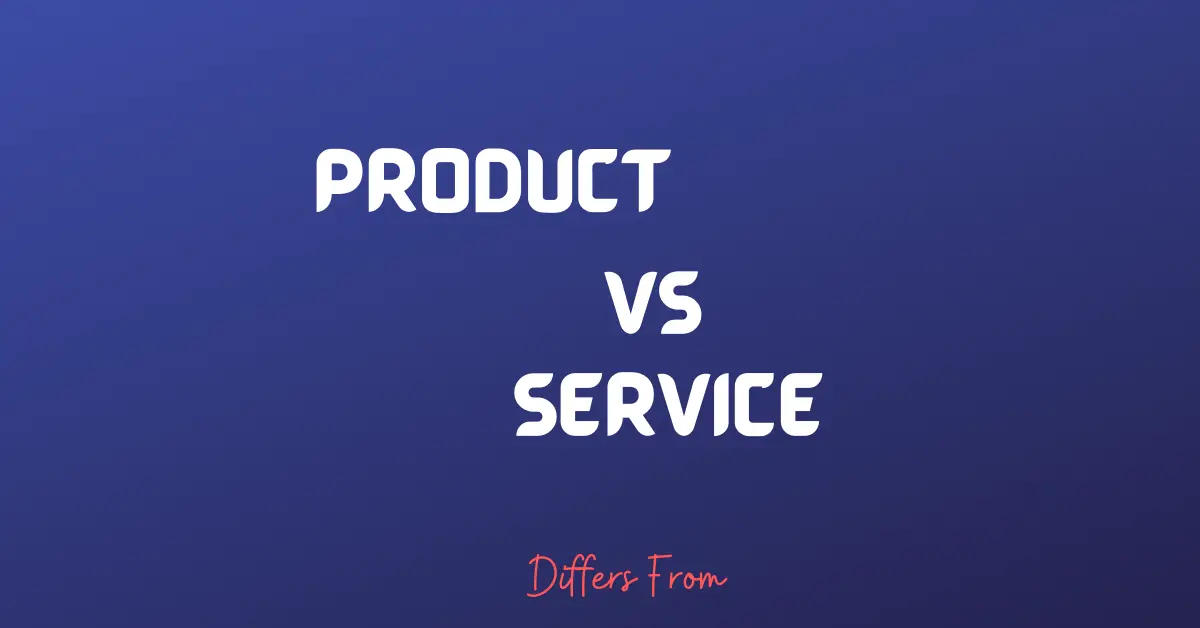The main difference between product and service is tangibility. Product is Tangible where service is intangible which means we can touch and feel the product wherein in the case of service we can’t touch it. There are more differences, we will explain them with definition and infographic below. We will also explain the difference between product and service business later in this article
Definition of Product?
A product is a tangible item that you purchase to satisfy a need or want.
A product can be something as simple and necessary as groceries, but it also includes items such as electronics, clothing, toys- the possibilities are endless!
Definition of Service?
Service is a commitment to deliver something that benefits another person.
The word service has been used for centuries and in many different contexts, but it is often associated with jobs such as wait staff or customer service. It can also refer to the support offered by doctors and nurses in hospitals or social workers who help people transition from homelessness into their own homes and communities. Service providers are typically paid for their work, but they may be volunteering instead of being compensated monetarily.
People who provide services do so with the understanding that they will not receive anything directly in return for what they have done other than knowing they have helped someone else.
Comparison : Product vs Service
| Product | Service | |
| Meaning | Products are objects or systems made available for consumer | Services are transactions where no physical goods are transferred from the seller to the buyer. |
| Tangibility | Tangible | Intangible |
| Sells | Value | Relationship |
| Expenses | More Expensive | Less Expensive |
| Who comes to whom? | Products come to customers. | Customers come to service. |
| Production | Products are manufactured, stored, and transported | Services cannot be manufactured, stored, or transported. |
| Consistency | Products sold can be identical | Each delivery of a particular service is never exactly the same as the previous services or future services. |
| Separability | Product and the company producing it are separate | Service cannot be separated from its provider. |
| Customization | Products cannot be customized as per requirements. The company needs to launch new products for the targeted audience. | Services vary from person to person, so they can be customized immediately. |
| Retunibility | The product can be returned | Service can’t be returned. |
| Durability | Products have a longer life. If I put a book on the shelf and don’t sell it today, I can still sell it for some period of time beyond today. | Service offered and not consumed today is lost forever. If I don’t sell my hotel room tonight, I cannot ever sell it – it is gone forever. |
Infographic of Difference between Product and Service

Summary: Key Difference Between Product and Service
- Products are things that you can buy and use, like a car or blender. Services are transactions where no physical goods are transferred from the seller to the buyer. Unlike products, services can’t be manufactured or stored and must happen in real time, like a haircut service for example.
- Products are tangible, manufactured objects or systems that can be sold to consumers and bought back again. Services include intangible things such as haircuts that have to take place right away due to their nature of being intangible rather than tangible objects like when you buy an apple at farmer’s market or Walmart grocery store versus buying it off your neighborhood grocer who stocks them all year round.
- It is much harder for consumers to evaluate the quality of a service than it is when they are evaluating the quality of a product. If you buy an anti-dandruff shampoo and find that your dandruff disappears, then there’s no need to question whether or not it works because you’re seeing results right before your eyes. But what about if someone hires their lawyer for them? It can be hard to tell how good he/she performed until after everything has gone down (or back up.)
Difference between Product Based Business and Service Based Business
We already know the difference between product and services.
Product-based businesses differ from service-based business in may ways. These are including beginning and operating costs, as well as the best marketing tactics.
The main difference between product and service based business is a product business sells real, tangible items, whereas a service business gives value through intangible talents, experience, and time.
Marketing techniques are also different for these two types business. Understanding these distinctions might assist you in developing the best approach for your company.
Product Business Vs Service Business : Comparison
| Product Based Business | Service-Based Business |
| Highlight the salient features | Highlight the personalization and how the business will meet the customer needs. |
| display the product in-store or online for customer view | Display the credential and testimonial of the previous customer |
| In some cases, customers can touch or try the product. | It’s not possible in a service-based business. You already know why! |
| With the product, a customer can easily determine its value. | With service, customers can not determine the value as it may take time to get a result. |
| In online business, customers can rate a product. This helps the prospective customers to decide whether they would buy the product. | As like product-based business, it is also possible to rate service. But a bad review has a significant impact on service-based business. Because it does not possibly return the service. |
| Maintaining an inventory is the biggest challenge in Product based business | Service-based does not need to maintain inventory, but they need to maintain the relationship. |
| Expensive because business needs to maintain store and inventory | Inexpensive as the business does not need to maintain any inventory |
FAQs ( Frequently Asked Questions)
What are the two types of products in marketing?
Product is the first P of the marketing. Products are broadly divided into two categories:
- Consumer products
- Industrial products
What is a consumer product?
Consumer products refer to the products that the consumer purchases himself for direct uses. They purchase these products to meet their needs and desire. Examples of consumer products are brushes, foods, mobile phones, etc.
What are the different types of consumer products?
There are mainly four types of consumer products, these are:
- Convenience Products
- Shopping Products
- Specialty Products
- Unsought Products
What are convenience products?
Consumer products are purchased most frequently and require very little effort. These products have ongoing and continuous demand among the purchaser. Due to this, these products are purchased very often and very convenient to purchase. The price of these products is generally lower and bought in small quantities by the consumer.
For example, think about purchasing sugar or salt. We need these products very frequently and fall in our routine also. We don’t think much about the brand of the product and often bought immediately without much comparison to other brands.
What are the shopping products?
Consumers take considerable time and effort to purchase shopping products. They read review guides on websites, compare prices and features. They also scrutinize the brands before making the decision to buy. Some examples of these products are Smart TV, Furniture, etc.
You may think about the guitar you want to buy. You don’ buy guitars frequently. So, giving considerable time and effort before buying guitars may save your money in the long run. You may visit websites to know what others opinion about it and compare the prices with features to get the best guitar within your budget.
What are the specialty products?
Specialty products are the types of products for which consumer is willing to put lots of effort before making the buying decisions. Because these products are very special for the consumer and related a lot of money because the price of special products is high. For this reason, the demand is limited and companies are only focused on the targeted consumers. Artworks, Paintings, hi-end tech products can be examples of special products.
We may think about purchasing a car for your personal use. We may compare various brands to find the best car. We may want some features which all the brands are not offering. So, we ask for others’ opinions, read a lot of review articles even visit locations A to B if required.
What are the Unsought Products?
Unsought products refer to this kind of product about which consumers either do not know much about it or usually don’t buy until a certain need arises. For example, think about funeral products, fire extinguishers etc. Companies need to do more advertising and publicity for these products to be known among the customers.
What are industrial Products?
Industrial products are mostly used as input for manufacturing other products. In comparison with consumer goods, these products are not used for direct consumption. Some examples of industrial products are raw materials, machines, tools, etc. these products are used in businesses and factories.
What is the product life cycle?
The product life cycle is a representation of the cycle through which each product goes through from introduction to decline and eventual demise of the product. The Product Life Cycle helps us recognize which stage the products are in. Accordingly, the company can adjust its marketing strategy to make most of the conditions.
What are the five stages of the product life cycle?
The five stages of the product life cycle are following:
- Development
- Introduction
- Growth
- Maturity
- Decline
What are the four stages of the product life cycle?
- Market Development
- Growth
- Maturity
- Decline
What are the characteristics of services?
- Lack of ownership
- Intangibility
- Inseparability
- Variability
- Perishability
- User participation
What are four types of services on basis of ownership?
- Government for profit
- Government for nonprofit
- Non Government for profit
- Personal services
Effective customer service can determine the difference between a satisfied customer who will return again and again versus an unsatisfied customer who will not only never come back but also tell everyone they know about how awful your company was to them.
Let’s talk more about how you can differentiate products and services!

